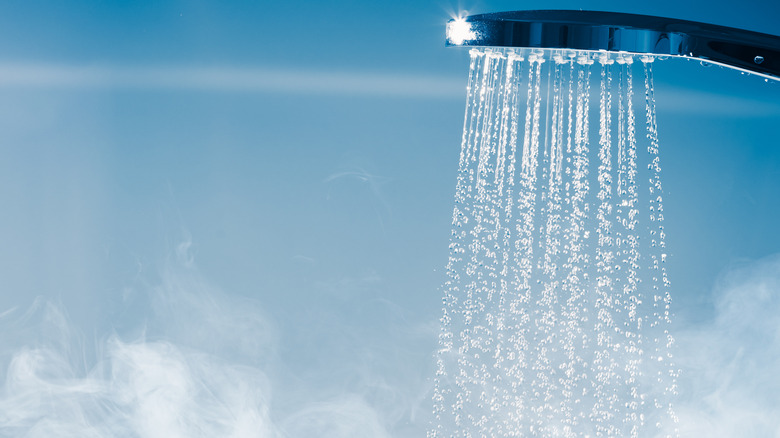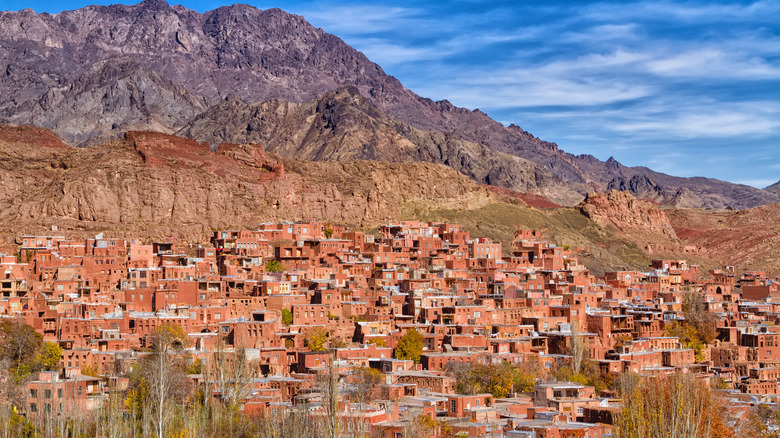The True Story Of A Man In Iran Who Died Just Months After Bathing For The First Time
How often are we 'supposed' to bathe? The conventions are very difficult to pin down. After all, context is critical here. Somebody who embarks on long days of physical labor, or a lengthy workout at the gym, may certainly feel a pressing need for a thorough wash as soon as possible. Others simply can't eschew their morning/evening shower ritual, whether they're particularly 'dirty' or not.
Medical advice on the matter varies a lot. Harvard Health Publishing reports that a good shower or bath every day may leave us feeling fresh and squeaky clean, but it may be doing us more harm than good. The delicate balance of microorganisms on our bodies can be adversely affected, and the hot water can dry out our delicate skin. On the subject of water, overzealous bathing habits can expend tremendous amounts of it. Waterwise reports that Scotland, seemingly the heaviest water-user in the United Kingdom, uses an average of 44 gallons (165 liters) of water per person, and showers and bathtubs surely account for a lot of that use.
Clearly, then, frequent bathing can be costly, both for the environment and for the skin, but one man took not bathing to a whole new level. Here's the sad tale of the Iranian man who died shortly after the first bath he ever took in decades of his long life.
The incredible of Amou Haji
While the balance for the 'correct' frequency of bathing will differ from person to person (activity levels and considerations like skin conditions must be taken into account), there's no doubt that swearing off bathing can have negative effects too. Elizabeth Tanzi, of the George Washington University Medical Center's dermatology department, reports (via Allure) that "when the skin is not cleansed or exfoliated, it can get itchy from a lack of exfoliation, and a pink greasy scaly rash can form on certain parts of the face, scalp, and chest."
This, Tanzi conceded, is a generalization, and different skin types react differently. Nonetheless, cases such as that of "Amou Haji" of Iran are definitely outliers. The Guardian reports that "Amou Haji" is the nickname given to somebody of advanced age in the country, and for one particular man who made news in an extraordinary way.
This particular Haji, according to the outlet, experienced what the people of his home village of Dejgah deemed "emotional setbacks." As a result of these, it seems, he started to refuse to bathe, and did not do so for more than six decades. He "reportedly ate roadkill and smoked [a] pipe filled with animal excrement," according to the outlet. The BBC reports that, over the decades, concerned well-wishers had tried to convince him to bathe, but he rebuffed them, wary that showering or washing would make him ill.
Was bathing to blame?
The IRNA reported, via the BBC, that "soot and pus" covered Haji's skin, yet he continued to maintain his no-bathing policy until 2022. That year, locals who continued to fear for his health were able to entice him to wash for the first time.
Tragically, this kind treatment was some of the last he would ever receive. On October 23 that year, a matter of a few short months later, he died, per the IRNA. Having reached the grand old age of 94 despite his sooty ways, it seems that Haji was far healthier than he may have looked. The fact that he became ill shortly after bathing, a fear that contributed to his unwillingness to do so in the first place, may or may not be connected.
In January 2014, the Deccan Chronicle stated that Haji's long stretch without bathing was a world record, surpassing that of Kailash Singh (who had not bathed for 38 years, according to The Tehran Times). This isn't an official record, though Haji's sad death and extraordinary life deserve to be remembered.


